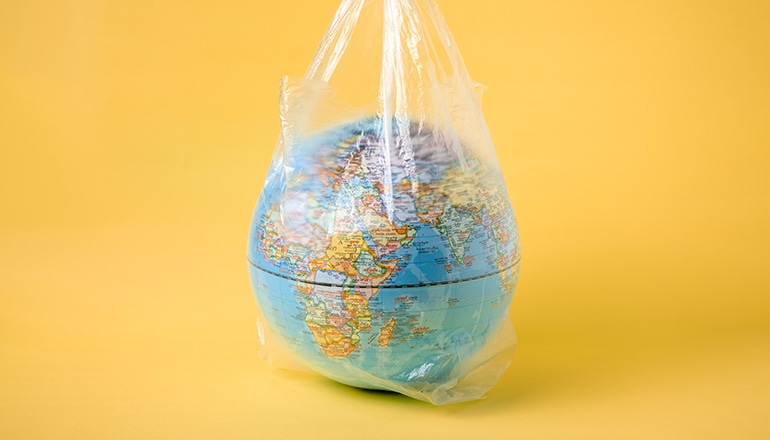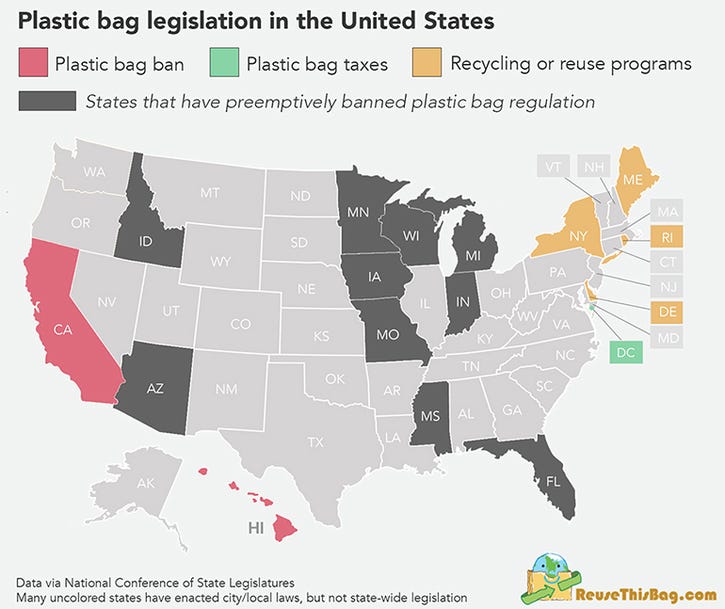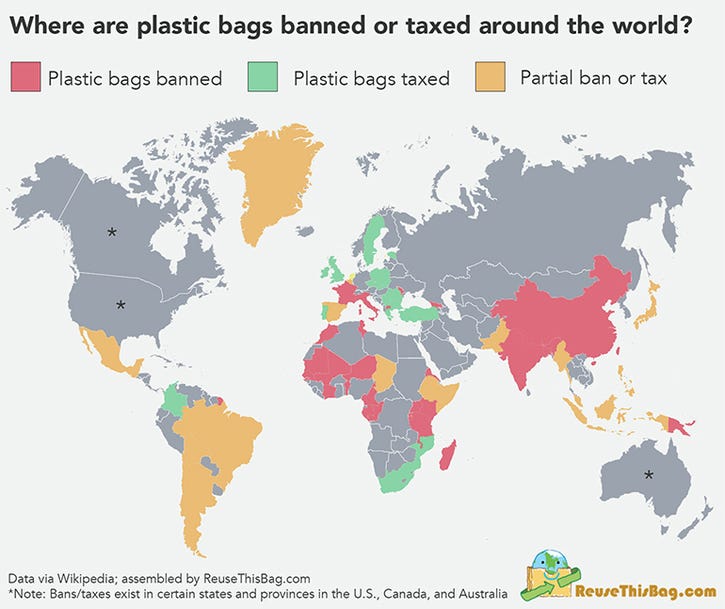Study: Where are Plastic Bags Banned Around the World?
A newly released study analyzes U.S. states and cities and countries around the globe that are leading the way for plastic bag bans.

The average single-use plastic bag picked up at the grocery store has a lifespan of about 12 minutes. When discarded, the bags clog sewage and storm drains, entangle and kill marine mammals every year and degenerate into toxic microplastics that fester in oceans and landfills.
Communities in the U.S. and around the world have begun to mobilize to reduce waste by banning, taxing or otherwise limiting the use of single-use plastic bags. ReuseThisBag.com wanted to take a big-picture look at where legislation has been passed and what its effects have been. In a newly released study, “Where are Plastic Bags Banned Around the World,” the organization analyzes which cities in the U.S. are leading the way for plastic bag bans, and internationally, which countries have made the most significant push.
Here are some key takeaways from the study:
In the U.S., only two states—California and Hawaii—have banned plastic bags on a statewide level.
Four U.S. states—Delaware, Maine, Rhode Island and New York—have mandatory recycling or reuse programs in place.
Ten U.S. states—Arizona, Florida, Idaho, Iowa, Indiana, Michigan, Minnesota, Missouri, Mississippi and Wisconsin—have placed preemptive bans on banning plastic bags.
Nearly 200 U.S. municipalities have banned or taxed plastic bags; outcomes have been largely positive. For instance, San Jose, Calif., saw a reduction of plastic bags in storm drains (89 percent), rivers (60 percent) and residential areas (59 percent). San Francisco saw a savings of up to $600,000 per year in plastic processing fees. Seattle saw a reduction of plastic bags in both residential (48 percent) and commercial (76 percent) waste.
Globally, plastic bags are banned in 32 countries, 18 of which are in Africa.
In America, only two states have conclusively banned single-use plastic bags: Hawaii and California. Though Hawaii’s ban came first, it wasn’t technically a statewide ban: all five Hawaiian islands (Big Island, Honolulu, Kauai, Maui and Pala) individually banned plastic bags at various points—the last of which took effect in 2015. The bans, which aim to fully phase in by 2020, range in definition and severity but generally still allow for the use of 100 percent recyclable plastic bags.

California passed a unilateral, statewide ban in September 2014 that went into effect in November 2016. The law bans single-use plastic bags at all large retailers and imposes a 10-cent charge for paper bags. Before the law was passed, more than 100 California counties already had various bans in place.
In 2009, Washington, D.C., imposed a 5-cent tax on all single-use plastic bags after independent studies found them to be the single largest source of pollution in local waterways—and a number of states (New York, Maine, Rhode Island, Delaware) have put partial taxes or bans into place but haven’t yet made the full leap.
Meanwhile, 10 states—Arizona, Idaho, Iowa, Minnesota, Michigan, Missouri, Indiana, Mississippi, Florida and Wisconsin—have preemptively banned plastic bag bans, proving that the plastic industry’s heavy lobbying paid off.
Since the two statewide bans are relatively new, data on outcomes are still largely unfounded, but the study turned to the more than 200 individual cities and municipalities that have enacted ordinances around the country.
“America is far from the most progressive country when it comes to plastic bag bans internationally,” according to the study. “At least 32 countries around the world have plastic bag bans in place, and nearly half are in Africa, where plastic bags frequently clog drains, leading to increased mosquito swarms (and, as a result, bouts of malaria). The bans in these countries range widely in severity, but Kenya’s, put into place last year, surely take the cake: anyone ‘making, selling, of importing’ plastic bags could face fines of up to $19,000 and four years in jail.”

The study also noted that in China, plastic bag waste was so bad that it led to the coining of the term “white pollution.” A full ban was adopted in 2008, and since then, plastic bag waste has dropped by 60 to 80 percent. The country does, however, still face enforcement issues. And in India, where an estimated 20 cows per die from plastic ingestion, a ban has been in effect since 2002.
Some 18 countries also have taxes in place, which have proved to be a viable alternative to a full ban, the report notes.
In Ireland, a 22-cent plastic bag tax has reduced usage by as much as 90 percent. Portugal has seen a drop in excess of 85 percent. And since imposing a tax in 2003, Denmark has seen the lowest plastic usage in Europe, averaging just four bags per person, per year.
About the Author(s)
You May Also Like


